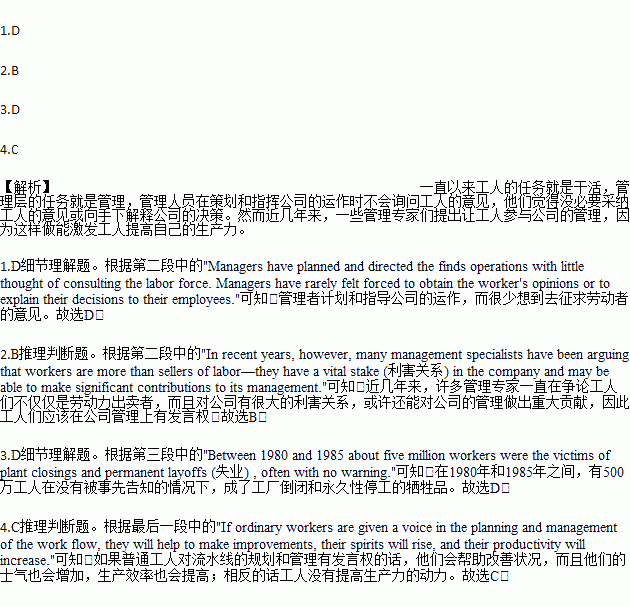题目内容
Traditionally, it has been the worker's role to work and management's role to manage.
Managers have planned and directed the finds operations with little thought of consulting the labor force. Managers have rarely felt forced to obtain the worker's opinions or to explain their decisions to their employees. At most, companies have provided "suggestion boxes" in which workers could place ideas for improving procedures. In recent years, however, many management specialists have been arguing that workers are more than sellers of labor—they have a vital stake (利害关系) in the company and may be able to make significant contributions to its management. Furthermore, major company decisions affect workers and their dependants. This is particularly true of plant closings, which may put thousands on the unemployment lines. Should workers, then, play a stronger role in management?
Workers should have a role in management. At the very least, the labor force should be informed of major policy decisions. A common complaint among ordinary workers is the lack of information about company policies and actions. Between 1980 and 1985 about five million workers were the victims of plant closings and permanent layoffs (失业) , often with no warning. At least 90 days' notice ought to he given in such circumstances so that workers have time to adjust. Management should consult workers before closing a plant, because the workers might be able to suggest ways of improving productivity and reducing costs and might be willing to make concessions (妥协) that will help keep the plant operating.
It should become a general practice to include workers in some managerial decision making. There ought to be representatives of the workers on the firm's board of directors or other major policy-making groups. If ordinary workers are given a voice in the planning and management of the work flow, they will help to make improvements, their spirits will rise, and their productivity will increase. As a further incentive (激励), they must be given a share in the company's profits. This can be done through employee stock ownership plans (员工持股计划), bonuses, or rewards for efficiency and productivity. Finally, when a plant can no longer operate at a profit, the workers should be given the opportunity to purchase the plant and run it themselves.
1.What can we learn about managers from Paragraph l?
A. They were not quite qualified.
B. They disliked "suggestion boxes".
C. They never consulted the labor force.
D. They seldom obtained workers' opinions.
2.In recent years, many management specialists have been arguing that workers ________.
A. are not sellers of the products any longer
B. should have a say in management of the company
C. are less affected by company decisions than before
D. are able to make the final decisions for the company
3.According to the passage, what happened between 1980 and 1985?
A. Workers did not make necessary concessions.
B. Many companies were closed because of strikes.
C. Managers consulted workers before closing a plant.
D. About 5 million workers were laid off without advance notice.
4.If they are not given a voice in managerial decision making, workers ________.
A. cannot get a share in the company's profits
B. will not have the opportunity to purchase the plant
C. may lack the incentive to increase their productivity
D. can still get bonuses for efficiency and productivity


 following is the newspaper editor’s opinion according to Paragraph2?
following is the newspaper editor’s opinion according to Paragraph2?